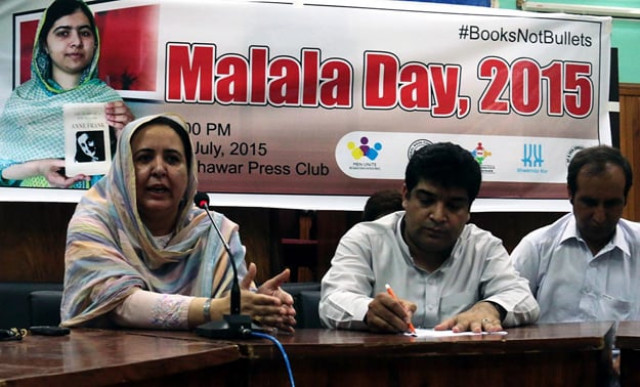Malala Day : ‘It is time for children to be heard’
Social activists say youth plays pivotal role in promoting education.

Social activists say youth plays pivotal role in promoting education. PHOTO: ONLINE
This was said at a press conference at Peshawar Press Club on Tuesday to commemorate the occasion. The event was organised by the Pakhtunkhwa Civil Society Network (PCSN) in collaboration with other NGOs.
Malala Day is observed every year on July 14. The purpose is to not just celebrate child education but to show the enemies of education that students are stronger than terrorists.
During the event, social activists said access to education should not be limited by borders, income, disability, gender or ideology. They insisted girls in the province had been disadvantaged by the lack of educational opportunities available to them.
According to the speakers, Malala Day is an opportunity to emphasise the importance of sending all children to school and highlights the right to quality education even in the most difficult of circumstances.
“Malala is an inspiration to millions,” said Men Unite Coordinator Qamar Naseem. “The Khyber-Pakhtunkhwa government should immediately adopt a resolution in favour of Malala Yousafzai. Girls in Pakistan are often denied the opportunity to go to school. This limits their prospects, puts them at risk of exploitation and limits economic progress in the entire country.”
Books, not bullets
Naseem said Malala’s bravery and determination mirrors the struggle of children who risk their lives to get an education.
“On Malala Day, we urge our leaders to invest in books instead of bullets,” he said. “Books, not bullets, will pave the path towards peace and prosperity.”
Speaking on the occasion, rights activist Zar Ali Khan said it is upsetting to see that children in the tribal areas are exposed to violence, displacement and radical ideologies. “However, it is encouraging to see how one girl’s struggle has become a message for education all over the world.”
Changing the game
Khwendo Kor’s Maryam Bibi said education for girls is the only way to improve the lives of people and generate economic development.
“Even though progress has taken place in recent years, girls in Pakistan continue to suffer severe disadvantages and face exclusion from education systems. Malala gives us hope and encourages change.”
PCSN Coordinator Taimur Kamal said underlying factors still make the state education system inefficient despite improvements which have taken place over the last 20 years. “They must be addressed,” he said. “This is the only way to ensure that girls get access to education.”
Kamal said no child should be killed for going to school and no teacher should fear imparting education.
“Together, we can and we must change this picture; this should be the vision for Pakistan,” he added.
Rakshanda Naz, a social activist, said Pakistan is facing countless social, economic and political problems.
“We should find solutions to these problems,” she said. “Education policies should be changed and we should raise awareness about equal access in education among boys
and girls.”
Published in The Express Tribune, July 15th, 2015.













COMMENTS
Comments are moderated and generally will be posted if they are on-topic and not abusive.
For more information, please see our Comments FAQ